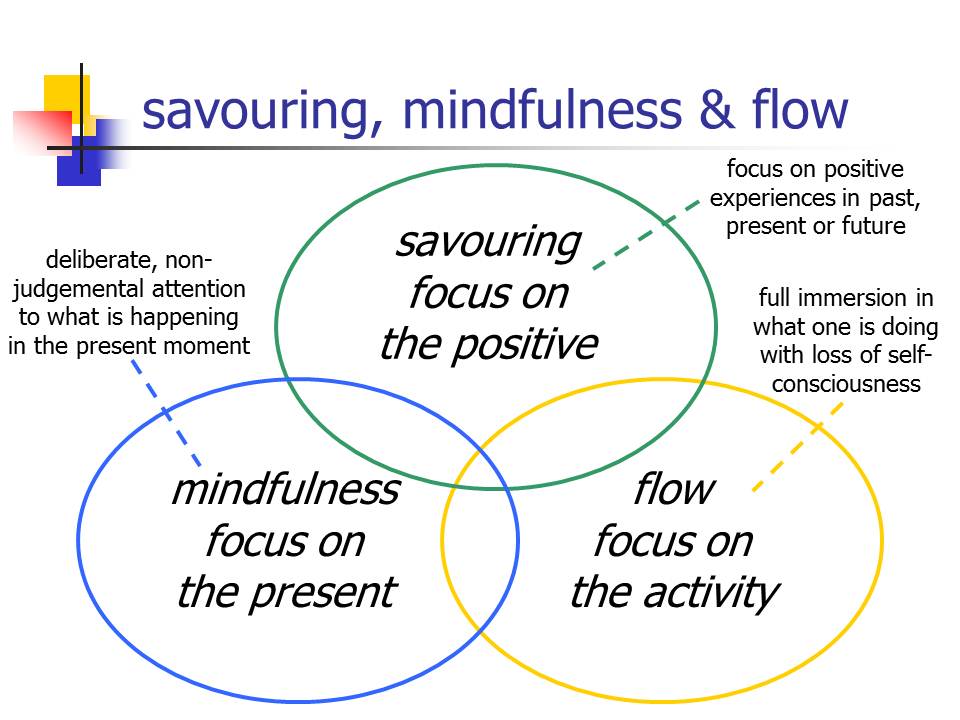Savouring, mindfulness & flow
Last updated on 8th June 2017
In a post on 27 January I wrote about "savouring" - the appreciation of positive experiences. Savouring is, as it's name suggests, a sort of running the positive experience around in one's mouth, really tasting, valuing and enjoying it - a bit like slow, careful appreciation of a good wine. Bryant and Veroff, authors of the key current text on savouring (see below), draw parallels between the importance of being good at coping with negative life experiences and the importance of being good at savouring positive life experiences. Savouring well increases one's happiness, wellbeing and appreciation of being alive. On the fine Authentic Happiness website, Seligman and colleagues discuss three entwining roads to happiness and what they call "the full life". One of these three roads is maximising and appreciating positive emotions - very much the territory of savouring.
Of course savouring can help us become happier more of the time. Fascinatingly, and importantly, nourishing positive emotions & savouring can also protect against negative emotions like anxiety and depression (Burns, Brown et al. 2008; Wichers, Myin-Germeys et al. 2007). Feeling good can also help us function better - positive emotions can help us think more creatively, problem solve more effectively, and relate to others with more warmth and kindness. See both Barbara Fredrickson's PEP lab and my own PowerPoint handouts (below) for more on this.

Savouring focuses on positive emotions. It's interesting to contrast how this overlaps with mindfulness's focus on the present moment, and flow's focus on the activity one is involved with (see above). Developing mindfulness typically takes persistent, dedicated practice. Flow's immersion in current activity often also involves dedication to what one is doing - whether it's playing a game, cooking a meal, or reading a book. I suspect we don't take feeling good seriously enough. I certainly feel that I haven't given this whole area the interest and importance it deserves. The slogan "Let's get serious about feeling good" has a certain paradoxical appeal!
Bryant, F. and J. Veroff (2007). "Savoring: a new model of positive experience." Mahwah, New Jersey: Lawrence Erlbaum. [AbeBooks] [Amazon UK]
Martin Seligman's "Authentic Happiness" website. http://www.authentichappiness.sas.upenn.edu/Default.aspx Accessed April 9, 2008.
Burns, A. B., J. S. Brown, et al. (2008). "Upward spirals of positive emotion and coping: Replication, extension, and initial exploration of neurochemical substrates." Personality and Individual Differences 44(2): 360-370. [Abstract/Full Text]
Wichers, M. C., I. Myin-Germeys, et al. (2007). "Evidence that moment-to-moment variation in positive emotions buffer genetic risk for depression: a momentary assessment twin study." Acta Psychiatr Scand 115(6): 451-7. [PubMed]
Barbara Fredrickson's "Positive Emotion and Psychophysiology (PEP) Lab". http://www.unc.edu/peplab/home.html Accessed April 9, 2008.
Hawkins, J. "Positive emotions." PowerPoint slide handout 1 [Free Full Text] & 2 [Free Full Text] - these can be printed out as two-slide-to-a-page handouts.
Hawkins, J. "Savouring, Mindfulness & Flow." Powerpoint slide handout [Free Full Text]
Wikipedia article on Flow. http://en.wikipedia.org/wiki/Flow_(psychology) Accessed April 9, 2008.

Freeforming - savour and flow
Submitted by Peri Mackintosh (not verified) on Sat, 18/06/2011 - 10:10.
HI
This very much points to what is at the heart of Freeforming. Great!
Freeforming - savour and flow
Submitted by Stressed To Zest on Sun, 19/06/2011 - 05:01.
Thanks Peri ... Freeforming looks fascinating. You might also be interested in parallels with "Meeting at relational depth" - see the sequence of blog posts at http://goodmedicine.org.uk/calendar/2010/10/all
With best wishes for you and your work, James